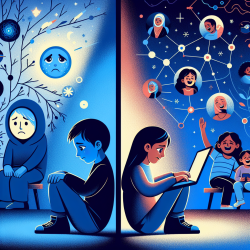Embracing Connection: A Path to Reducing Loneliness in Children
As practitioners in the field of speech-language pathology, we are uniquely positioned to influence the social and emotional well-being of children. The recent study titled "I'm alone but not lonely. U-shaped pattern of self-perceived loneliness during the COVID-19 pandemic in the UK and Greece" provides valuable insights into how self-perceived loneliness fluctuated during the COVID-19 lockdowns. This research highlights the importance of social support strategies, even during periods of isolation, and underscores the dissociation between social support and loneliness.
Understanding the U-Shaped Loneliness Pattern
The study utilized a data-driven machine learning approach to analyze self-perceived loneliness among participants in the UK and Greece during the lockdown. A significant U-shaped curve was identified, with lower loneliness levels reported during the 4th and 6th weeks of lockdown. This suggests that loneliness is not merely a function of social isolation but is influenced by perceived social support.
Implications for Practitioners
As practitioners, we can leverage these findings to enhance our interventions with children. Here are some strategies to consider:
- Enhance Social Support: Develop programs that foster peer interactions and build a sense of community among children, even in virtual settings.
- Monitor Emotional Well-being: Regularly assess children's feelings of loneliness and provide support through counseling or peer support groups.
- Educate Families: Encourage families to engage in activities that promote social connection and emotional support, such as family game nights or virtual meet-ups with friends and relatives.
Encouraging Further Research
While the study provides a foundational understanding of loneliness patterns during lockdowns, there is a need for further research to explore the long-term effects of social isolation on children. Practitioners can contribute by conducting longitudinal studies that track emotional and social development over time.
Conclusion
The insights from this research underscore the importance of addressing loneliness in children, especially during times of social isolation. By implementing targeted social support strategies, we can help mitigate the effects of loneliness and promote positive developmental outcomes. As we continue to adapt to new challenges, let us remain committed to fostering connections and supporting the emotional well-being of the children we serve.
To read the original research paper, please follow this link: I'm alone but not lonely. U-shaped pattern of self-perceived loneliness during the COVID-19 pandemic in the UK and Greece.










